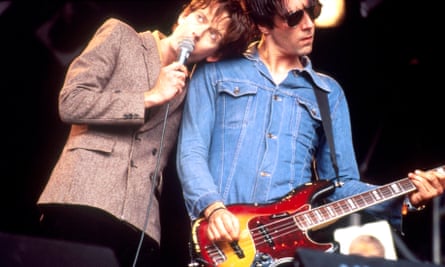I knew Steve Mackey mostly as a producer. I suspect I was exposed to about one tenth of his talent. I met him when he came to help produce an Arcade Fire record, Everything Now, in 2015. We were excited to work with him for a few reasons – Pulp was a very relevant influence for our band, and it seemed plausible that he’d be good with band dynamics, having navigated them in his own life. He was also great at making beats and into all sorts of dance music. It seemed like he’d be game to go where the music led.
Production in our case was partly a technical task, an engineering task: how do you take the sounds the band is producing and make them sound good? How do you connect a series of machines to make it so an idea can be expressed? And partly a curatorial task: which of these songs are exciting? Which of these ways to make the song reel sound the most promising? And partly a spiritual task, the ability to balance the needs of the different humans in the room. But it’s mostly to nurture some barely alive musical creature until it can breathe on its own. He was good at every aspect.
On a practical level, with Steve, it meant he sat in a series of rooms – many of them quite small – and listened to us play music for hours and hours; sometimes in groups, sometimes one on one. He always felt present but never obtrusive. Which maybe sounds like faint praise, or like I’m describing a lamp, but it’s honestly about the highest compliment I can think of for making certain kinds of art. It can be strangely lonesome trying to come up with a good idea (even in a big band!) and he made you feel less alone. He had such sharp musical judgment, and yet you never felt judged.
It’s not like he was too soft – I can definitely remember the tone of his voice expressing disdain for something. I remember him being lovely to everyone – to everyone in the band, to the crew, to staff, to cab drivers – he was so goddam lovely. It feels generous looking back, but it also felt generous at the time – he didn’t have to be so sweet.
He absorbed music. If you played something interesting, even if it wasn’t of use at the moment, you felt as if he was absorbing it, that it wasn’t just dissolving into the ether. And not just in the studio – anywhere he heard something he liked, on the speakers at a restaurant, the bass blaring from a passing car, he was taking it in. He wasn’t necessarily easily impressed, but easily engaged and excited. He didn’t give the impression of encyclopedic knowledge but it seemed like he kind of knew everything. I obviously knew he was a great bass player. I am a giant Pulp fan, so it was very cool to get to hang out with him.
He was also extremely handsome. In general I don’t support making a person’s beauty a symbol of any sort of worth. But in so many arenas Steve seemed to have a combination of inborn ability polished by smart work and thoughtful choice; his handsomeness really seemed like it was of a piece with the rest of his work.
I don’t mean to put him on a pedestal. Mostly I thought of him as a friend. But a friend that – maybe you have one like this – I wanted to impress. I suspect I will continue to think of him as a friend I want to impress. But I would prefer it if he were here to tell me what he thinks.

